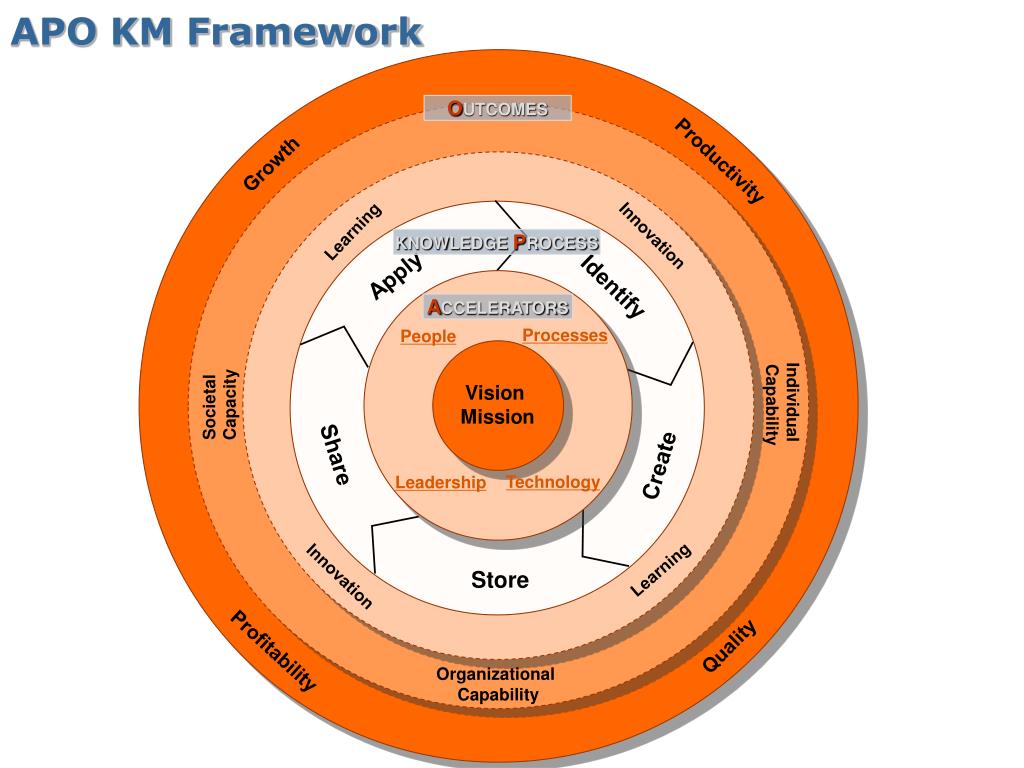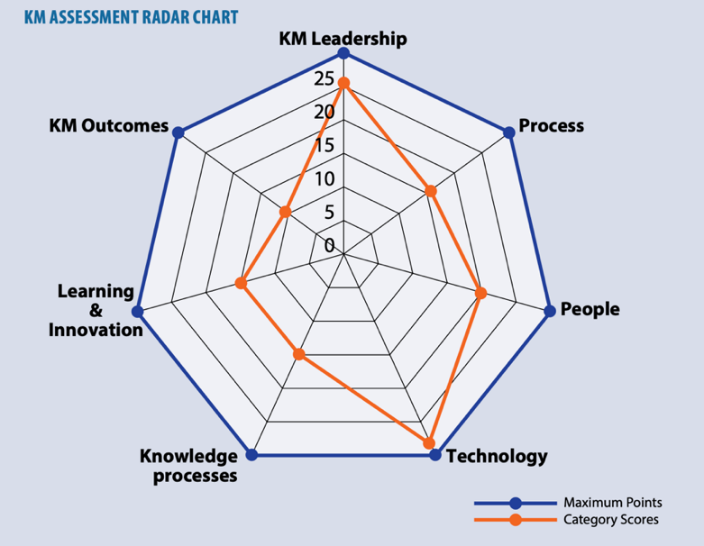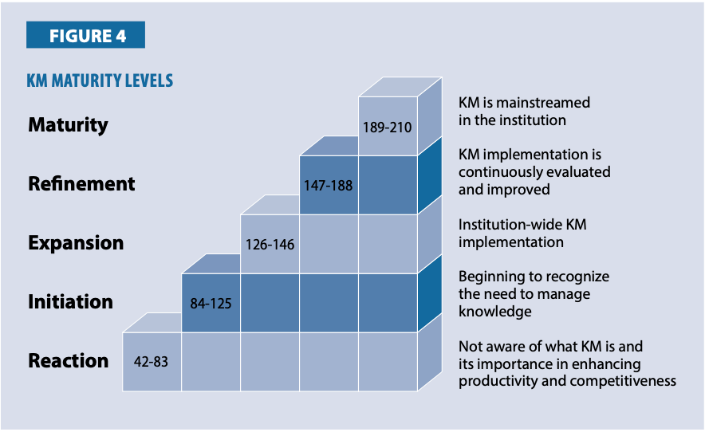Quantitative Analysis
Based on the survey, 46,2% of the respondents' age profiles are 26-35 years old. Next, 38,5% of the respondents are between 36-45 years old. Lastly, only 15,4% of the respondents were between 17 and 25 years old.
Besides age profile, most respondents have low education levels, with 38% graduating from high school and 31% merely finishing elementary school. Additionally, 15% of the respondents have a diploma level and the rest own a bachelor's degree. It can be concluded that most of the respondents are at productive age with low education level.
APO has been done to assess the company’s knowledge management readiness. From 13 respondents, the total score of the APO assessment is 115,9, which can be concluded that the current knowledge management readiness is at the initiation level. It means the company has started to realize the importance of knowledge management. The knowledge process category obtains the lowest score of 13,2, while the outcomes category receives the highest score of 20,7. Additionally, only the knowledge process is still in the reaction level, while the other category has achieved the initiation maturity level.
Qualitative Analysis
Moreover, to strengthen the knowledge management assessment, focus group discussions and interview were also conducted with the leaders, such as farm heads, operation management head and HRandGA head. Below is the result of the discussion for 7 audit categories in the APO framework:
Leadership
PT. Organic Farm’s management supports learning, innovation and collaborative work that can be proven by having a company’s value that is innovative and collaborative. Mrs. ER confirms the statement:
“I think the company has values that promote knowledge management. The core values in the company are collaborative and creative.”
It is only the farm head that has adequate knowledge about farming practices that makes the knowledge transfer limited from the farm head. On the contrary, limited knowledge of farming practices makes the farmer easier to be directed by the leaders.
Process
Weekly routine evaluation has been done at PT. Organic Farm to assess the production productivity. The weekly meeting is attended by the operation head and farm head only because farmers are still busy with operational activities. Mr. RS commented:
“We do evaluation together every week. In this meeting, we solve problems together and implement new ideas to motivate us to be more productive in the future. Moreover, it is to keep our production target on track and share new improvements currently in progress.”
Apart from evaluation, in terms of process, the company still does not have an emergency plan when there is force majeure. Emergency plans are coordinated impromptu by the farm head when a problem arises. For instance, when the farmer is suddenly absent without any information, the operational activities like plant schedule will also be disturbed.
People
The company has not put people development as its current priority and has yet to allocate a specific budget for internal and external training. The company incidentally sends the farm head to join external training to get more experience and broader knowledge. Mrs.ER commented:
“Currently, the company has not allocated a budget for people development. They only send the farm head to join some external training according to the need. The external training has not covered all employees but only the head.”
However, the company facilitates the employees with onsite training. The training is not yet done regularly and is usually delivered by the Operation Management Head and HRandGA Head. The farm head also trains their farmers by conducting an informal knowledge transfer called “Sarasehan,” in which all farmers come together and the farm head shares his technical knowledge with the farmers.
Technology
The company has begun to facilitate technology in the form of the Internet, but the coverage area is still limited due to the geographical location of the farm. Additionally, the company also provides computers in the office area.
The employee with access to computers, internet and email is only the farm head, while the farmers are focused on operational activity. Mr. A commented:
“In Jolok, access to the internet and computer is only for employees that stay in office (farm head). Not all employees can use computers due to the limited number.”
Currently, the company has a website that enables online ordering from sales to PT. Organic Farm. However, the system has not covered the documentation of the production process.
Knowledge Process
The company has many improvement processes in the production area that are not well documented. High farmer turnover makes it challenging to deliver the knowledge perfectly. The knowledge process started in the form of socialization (tacit-tacit) from the farm head to farmer and farmer to farmer. Although knowledge sharing has been done, the company has not yet systematically stored knowledge. Knowledge documentation is only in the form of a presentation report file from the farm head to the operation head. No knowledge database can be accessed by all employees when they forget their knowledge. Moreover, the company has started benchmarking with other companies but is limited to Operation Management Head and farm head due to a limited number of farmers. They study other farms that are more modern compared to PT. Organic Farm.
Learning and Innovation
PT. Organic Farm encourages a learning and innovation culture in the company by motivating employees to try new things they have never done before. Mr. RZ confirms the statement:
“For me, innovation is a must. I encourage my team to try something new in every weekly coordination meeting. Most importantly, they want to try new things and as a leader, we are ready to take a risk. In real practice, sometimes the result is success or failure. However, the most important thing is that I always push them to create something new. If you want to get new results, you should try new ways.”
At the moment, PT. Organic Farm still motivates the employee to do knowledge sharing verbally. Incentives and rewards in conducting knowledge sharing or production performance-based rewards have yet to be in place. Mrs. ER commented:
“Organic farm has not implemented reward-based performance and knowledge sharing reward. What we do now is a motivational reward that is given incidentally. We choose the employee subjectively based on their discipline and good attitude.”
Outcomes
PT. Organic Farm focuses on farm productivity increase to maximize profitability. The company tries to improve processes such as pest management to increase crop output and manage the organic wastes from farming activity. Mr. RS commented:
“In Ciherang, so many organic wastes cannot be treated well. With limited knowledge, I create compost to increase soil nutrient content. To confirm the compost content, I try to apply the compost to plant bok choy and the result is quite good.”
As a result, pests can be more controlled, which decreases the rejection rate. Moreover, the company also does knowledge sharing improvement by conducting Sarasehan to enhance knowledge delivery to the employee.
There is no difference between quantitative and qualitative data results. Both data strengthen each other to understand why specific categories have low or high scores. Relying on quantitative data or qualitative data only will mislead the company to propose a strategy to enhance knowledge management implementation. Hence, combining the two methods in the knowledge management maturity assessment will ensure validity.






